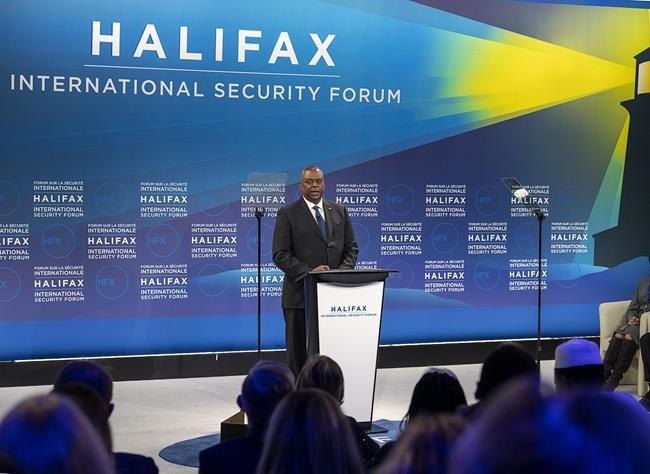HALIFAX — Maintaining support for Ukraine in its war against Russia is vitally important in a world increasingly under threat from autocratic regimes, the United States secretary of defense said Saturday.
In a speech at the Halifax International Security Forum, Lloyd Austin said Russian President Vladimir Putin’s “war of choice” in Ukraine is a threat to the rules-based international order that was established following the Second World War.
He said it’s an order where small states have the same rights as large ones and democracies such as the United States and Canada have security obligations “that we cannot walk away from.”
“Make no mistake: we will not be dragged into Putin’s war of choice,” said Austin. “But we will stand by Ukraine as it fights to defend itself. We will defend every inch of NATO territory.”
Austin warned that with a hard winter ahead in Ukraine, Putin may resort again to “profoundly irresponsible nuclear saber-rattling.”
But the secretary said that potential threat is a challenge the NATO alliance and other democratic countries will meet together.
Austin said stability and prosperity is at stake on both sides of the Atlantic.
“The U.S. trading relationship with the European Union is the largest in the world,” he said. “So when an aggressor manufactures a huge security crisis in Europe, it hits home for everyday Americans and Canadians.”
Austin said meeting the challenge in Ukraine is part of a broader strategy aimed at keeping the aggressive tactics of countries such as China and Iran in check.
He pointed to the Indo-Pacific region, where he said China is trying to expand its influence in a way that is “far from our vision of a free, stable and open international system.”
Austin said China’s military activities in the Taiwan Strait are growing “increasingly provocative,” with Chinese aircraft flying near Taiwan on a “near-daily basis.”
“These troubling trends highlight the imperative of working with our unparalleled network of allies and partners across both the Atlantic and the Pacific to deter aggression,” said Austin.
Meanwhile, an American congressional delegation of six senators and three members of the House of Representatives also highlighted the continuing need for a commitment to Ukraine in the aftermath of mid-term elections in the U.S.
Democratic Sen. Jeanne Shaheen of New Hampshire stressed the “critical importance” of standing up for democracy.”
“We are a bi-partisan delegation that represents the full span of the United States and I think it’s important for us to be here and to be here with representation from the administration,” said Shaheen.
Republican Sen. Jim Risch of Idaho said Austin’s speech was important because it both outlined U.S. foreign policy and explained the reasons behind it.
“What’s going on in Ukraine is really going to dictate how the world operates in the rest of this century,” said Risch. “How this ends is going to dictate how autocrats look at what their ability to do is.”
Democratic Sen. Chris Coons of Delaware told reporters it’s his hope the U.S. aid package to Ukraine will include more for humanitarian assistance, given the already robust military and economic help provided to date.
Coons said the need in Ukraine will only increase because of the current Russian bombing campaign, which has hit that country’s electrical infrastructure.
“I think there is a real risk of another wave of refugees and of intensified humanitarian need,” he said.
Earlier Saturday, Ukrainian Ambassador to Canada Yulia Kovaliv told a forum panel it’s estimated about 40 per cent of her country’s electrical grid has been destroyed or “massively hit” by Russian missiles.
This report by The Canadian Press was first published Nov. 19, 2022.
Keith Doucette, The Canadian Press



